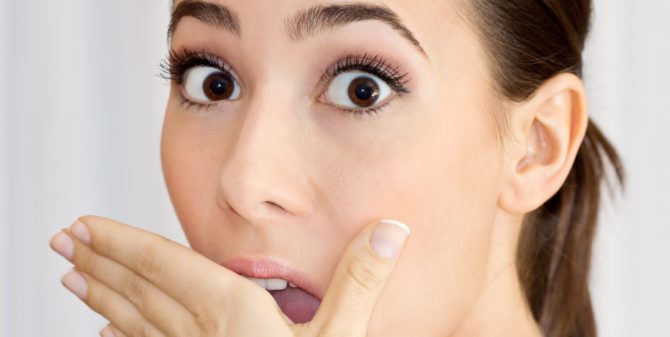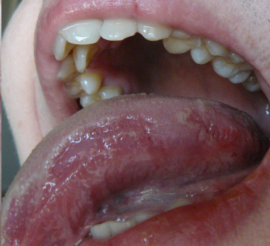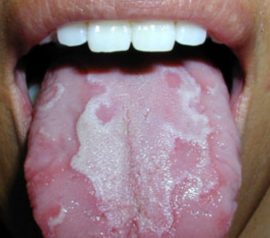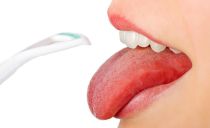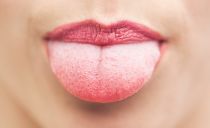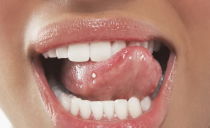Burning tongue - causes and treatment
This phenomenon, according to statistics, occurs more often in women older than 40 years, but not all cases depend on gender and age. A burning tongue symptom can suddenly complicate the life of both an adult and a child, and haunt a person for many years.
The feeling when the tongue burns is not an independent disease: this symptom indicates the presence of malfunctions in the body. They can be both local and general. therefore sometimes with a burning tongue a symptomatic treatment is enough, but more often it is necessary to establish the cause of the symptom through a comprehensive examination and eradicate it.
Glossitis and glossalgia
These are the main prerequisites for the manifestation of a symptom. One has an infectious nature, the other is associated with internal processes in the body.
Glossitis is an acute inflammation of the tissues associated with the presence of a source of infection in the oral cavity. The tongue turns red and swells, salivation becomes abundant, taste sensations and clarity of speech are lost. It is difficult for a person to chew food, possibly an increase in temperature and an increase in lymph nodes.
If glossitis does not begin to heal on time or get carried away with folk remedies, you can encounter an abscess, phlegmon of the neck and the appearance of growths on the tongue, as well as the transition of the inflammatory process to a chronic one.
With glossalgia, a “burning” tongue can outwardly look completely healthy. Or maybe change your appearance. The disease has not an infectious nature, but an immunological one: it is associated with a general weakening of the body due to internal diseases, a lack of vitamins and other phenomena.
With both pathologies, one cannot fail to notice redness, detachment of the epithelium, pustules and other unpleasant phenomena:
- "Geographic language" (desquamative glossitis). It looks like areas of fuzzy shape with a dead epithelium, due to the painful detachment of which a person feels how his tongue tingles or burns.
- Folded tongue. This is usually a deep longitudinal groove right in the center and symmetrical lateral branches. Folded areas are sensitive, easily irritated and can become a hotbed of candidiasis and other infectious diseases.
- Plaques and papules. Opening up, they secrete purulent contents. In addition, they create severe discomfort in the mouth.
- Small wounds, scratches. Associated with injury to teeth or solid food.
If everything is clear with the signs of injuries, then the reasons for the formation of the remaining phenomena must be dealt with in detail. To understand why the language bakes, and what to do with it, it is better to immediately contact a dental clinic.
Dental problems
This group of prerequisites includes unsuccessful prosthetics, malocclusion and a number of other situations leading to inflammatory processes in the mouth and in the competence of dentists of different specializations. If it nibbles the tip of the tongue, the dentist can determine the cause and treatment. Unpleasant sensations in the language will go away by themselves after eliminating annoying factors. The main ones are:
| Problem | Symptoms | Causes | Treatment |
|---|---|---|---|
| Candidiasis | White plaque in the form of curd deposits.
Redness is possible. Tingling at the tip of a muscle organ. |
Damage to the oral cavity and / or throat with Candida. | The use of antifungal drugs.
Increased general immunity. |
| Wearing dentures | The sensation is that the tongue is “baking,” which can spread to neighboring parts of the oral cavity. | Injury by improper denture.
Inflammation of the tongue, palate and gums due to a violation of the rules of oral hygiene. |
Orthodontic treatment. |
| Allergy to dentures and care products | The tip of the tongue is red and nibbles or itches.
Redness. Perhaps numbness. |
Contact with the allergen as part of dentures and crowns, as well as oral care products. | The use of antihistamines and enterosorbents.
Exclusion of allergen-containing products. Replacement of crowns and dentures. |
| Dental deposits and caries | Soreness.
Redness. Itching Burning. |
Continuous infection of the oral cavity.
Inflammatory processes in soft tissues. |
Oral hygiene.
Professional cleaning. Treatment of affected teeth. |
| Leukoplakia of the oral mucosa | The formation of white plaques from dead epithelium on the mucous membranes.
Pinching. |
Violation of desquamation of the epithelium. | The course of treatment with keratolytic drugs.
Sanitation of the oral cavity. To give up smoking. |
| Bruxism | In the morning, the tip of the tongue nibbles.
Teeth grinding in a dream. Injury to the mucous membranes. Erasing tooth enamel. |
Neurological, dental, psychological, congenital and some internal diseases. | The use of night tooth cap.
The treatment of damaged teeth. Consultation of a neurologist, dentist, psychologist and other specialists. |
Inflammation caused by dental problems will help remove ointments and creams with anti-inflammatory and regenerative effects: Metrogil denta, Solcoseryl and others. It is necessary to rinse after eating a solution of Furacilin or another disinfectant.
Non-dental problems
If the dentist during the examination completely excluded the problems falling within his competence, and the patient still nibbles and bakes his tongue, the reasons should be discussed with the therapist or with the pediatrician if it is a child. The local doctor will prescribe the necessary treatment or recommend contacting narrow specialists. Find out why the tip of the tongue hurts or pinches, or its entire surface burns, can:
- gastroenterologist;
- endocrinologist;
- neurologist;
- allergist;
- a diabetologist;
- rheumatologist;
- oncologist.
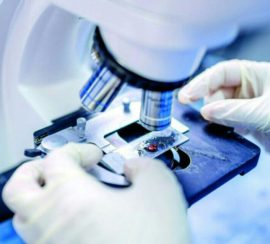 With inflammation of the surface and burning on the tip of the tongue causes may lie in a wide variety of internal diseases. In most cases, it is possible to establish the exact only with the help of laboratory tests. The main ones are:
With inflammation of the surface and burning on the tip of the tongue causes may lie in a wide variety of internal diseases. In most cases, it is possible to establish the exact only with the help of laboratory tests. The main ones are:
- general analysis of blood and urine;
- blood test for sugar;
- hormone tests;
- scraping from the tongue;
- throat swab;
- a study of gastric juice;
- Allergy testing
Diagnosis will help to identify diseases of the widest range. Redness of the tongue and burning are characteristic, for example, for diabetes mellitus, some sexually transmitted diseases, immunodeficiency states. When pinching the tongue, the reasons may lie in the following diagnoses:
- Xerostomia. It means dry mouth due to lack of salivation. It is observed with Sjogren’s disease, smoking and alcoholism, and occurs from dehydration in a hot, dry climate. The tongue is subject to permanent microtrauma due to dryness.
- Deficiency of certain vitamins or trace elements. Iron deficiency anemia, a lack of a number of B vitamins, zinc or folic acid can be associated with a sensation in which the tip of the tongue bakes.
- Hormonal imbalances caused by pathologies of the thyroid gland or adrenal glands, endocrine changes in adolescents or women during pregnancy or menopause, sometimes cause tingling, numbness, itching and burning of the lips and tongue, and sometimes the palate. Especially if in parallel there is an increased sensitivity of the skin, excessive sweating.
- Diseases of the gastrointestinal tract are very often accompanied by a burning sensation in the tongue, sometimes together with bitterness.First of all, with gastritis with increased acidity of gastric juice and heartburn, gastroesophageal reflux with reflux of gastric juice into the esophagus, as well as cholecystitis with impaired bile drainage. In case of poisoning and infections causing vomiting, the mucous membrane of the tongue is exposed to the caustic contents of the stomach and reacts with inflammation.
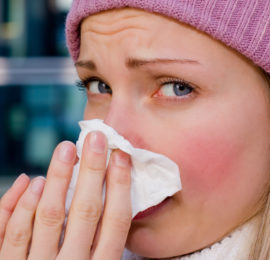 Colds and respiratory viral infections cause inflammation and infection of the mucous membranes of the larynx, tonsils, and sometimes the organs of the oral cavity, causing it to burn and pinch the tongue in the mouth.
Colds and respiratory viral infections cause inflammation and infection of the mucous membranes of the larynx, tonsils, and sometimes the organs of the oral cavity, causing it to burn and pinch the tongue in the mouth.- Cervical osteochondrosis, surprisingly, may well cause a feeling of numbness and pinching of the tongue. Sometimes speech is even disturbed. The reasons lie in the violation of blood flow and sensitivity of nerve endings in the cervical spine. Dizziness, pain and a feeling of numbness in the neck indicate the presence of this pathology.
- Herpes on the mucous membrane of the tongue and oral cavity. The picture of bursting papules over the entire surface can be supplemented by the red tip of the tongue and burning.
- Lichen planus. Non-infectious mucosal pathology of the type of dermatosis causes trophic lesions of the surface of the tongue and burning in the mouth.
Special attention should be paid to stress and nervous disorders, which can act as factors that provoke burning lips and tongue. That is why a patient with complaints of discomfort in the mouth, in the absence of organic lesions and normal results of tests, the general practitioner can recommend a consultation with a neurologist, and if necessary, a psychotherapist.
One of these manifestations is paresthesia. This is a mental disorder in which the patient feels that he is itching or pinching his tongue, or goosebumps creeping on him. In addition, numbness is possible in the complete absence of physiological causes. Similar sensations arise simultaneously in other parts of the body.
Treatment and prevention
First of all it is necessary to treat the underlying disease, due to which it tweaks the tongue and lips, or adjust its course. This can only be achieved with the responsible implementation of the doctor's recommendations.
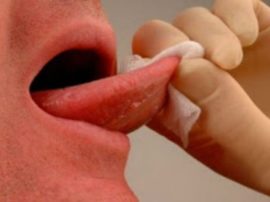 Sparing food: soups, mashed potatoes, mucous cereals of a comfortable temperature will help relieve irritation at the tip of the tongue and ease pain. It is mandatory to exclude from the diet spicy and salted foods, as well as excess sugar.
Sparing food: soups, mashed potatoes, mucous cereals of a comfortable temperature will help relieve irritation at the tip of the tongue and ease pain. It is mandatory to exclude from the diet spicy and salted foods, as well as excess sugar.
Several times during the day, and especially after eating, rinses should be carried out with solutions of Furacilin, Chlorhexidine or a weak solution of potassium permanganate. For extensive or deep lesions with a bright pain syndrome, applications with anesthetic solutions are used.
Necrotic plaque is removed with a cotton swab with Trypsin or Chymotrypsin, after which they are also treated with disinfectant solutions.
For speedy healing and restoration, oil solutions with vitamins A and E and specialized medications can be applied to the damaged mucosa only by a doctor’s decision.
Good helpers will be harmless folk remedies: rinses and lotions with medicinal decoctions of chamomile, string, oak bark, calendula. But in the absence of an allergic reaction and individual intolerance.
The decision to take antibiotics, antifungal drugs, immunostimulants should be made only by a doctor. With deep lesions with the development of an abscess, the patient can be referred for surgery. However, in most cases, with the competent identification of the causes of irritation of the tongue, its eradication is successful.
For this victory to be final, in the future it is necessary to strictly observe the measures indicated by the doctor for the prevention of basic diseases, oral hygiene, and the implementation of general procedures that strengthen health. The immune barrier will increase a sporting lifestyle, good nutrition and the refusal of an adult from bad habits.

